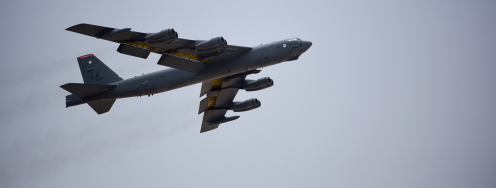Missile Defense Politics Could Make a Bad Situation in Europe Worse
On the radar: The perils of accelerated missile defense in Europe; Not a Cold War redux; An unrealistic centrifuge number from Iran; Poland shops for BMD; and India also lies about its missile defense tests.
May 16, 2014 | Edited by Lauren Mladenka and Geoff Wilson
From bad to worse - “The United States needs to show Russia that further interference in Ukraine or elsewhere in Europe would be a serious mistake. But Congress should be careful not to make a bad situation worse,” writes Tom Z. Collina in The Hill. “Unfortunately, that is what is what two recent pieces of legislation could very well do. Both the ‘Russian Aggression Prevention Act,’ introduced by Sen. Bob Corker (R-Tenn.) and other Republicans earlier this month, and the House National Defense Authorization Act (NDAA), passed in committee last week, seek to accelerate the deployment of a missile defense system in Poland, and the Corker bill would halt further nuclear arms reductions under the 2010 New START treaty so long as Russia threatens Ukraine. Both of these proposals may sound reasonable, but they are counterproductive and would undermine U.S. and NATO security.”
--“The two bills call on the Pentagon to accelerate deployment of the Aegis Ashore missile defense system in Poland by 2016, two years earlier than scheduled. The current Pentagon plan is to field Aegis Ashore with 24 SM-3 Block IIA interceptor missiles in Poland by 2018. This would be the third phase of the Obama administration’s European Phased Adaptive Approach (EPAA). Phase One is already deployed with SM-3 IA missiles on Aegis ships in the Mediterranean Sea. Phase Two would field Aegis Ashore with the SM-3 IB missile in Romania by 2015.”
--“There are two major reasons why spending hundreds of millions of dollars to accelerate the deployment of missile interceptors in Poland is the wrong response to Russia,” Collina says. First, there is “no military value against Russia. EPAA was never meant to counter Russian strategic (long-range) missiles.” Thus, accelerating the system would only provide “an excuse for russian escalation. Both the Bush and Obama administrations have tried to convince Russia that European missile defense is aimed at Iran and is not a threat to Moscow’s strategic missiles. But Russia is not convinced, and has resisted another round of bilateral nuclear arms reductions as a result… Accelerating missile defense in Poland and preventing New START reductions would be counterproductive. These proposals would do nothing to counter Russian strategic ballistic missiles or the threat of further Russian adventurism.” Full article here. http://bit.ly/1nRQSeu
Not too cold - “You could be forgiven for thinking the Cold War has returned with a vengeance,” writes Colum Lynch for Foreign Policy. “But while the United States has suspended some military-to-military cooperation exercises with Russia and has threatened to take steps designed to further isolate Moscow on the world stage, the former superpower rivals are finding ways to get along, working together to contain the spread of nuclear weapons and terrorism from Tehran to Tashkent and collaborating on an international campaign to halt mass atrocities in places like South Sudan.”
--“Barack Obama's administration and the government of Russian strongman Vladimir Putin are also continuing to cooperate on arguably the most important issue facing the United States and its top allies: Iran's nuclear program. Western diplomats had expressed concerns that their confrontation with Russia over Ukraine might spill over into the Iran talks, complicating an already difficult negotiation process. For now, those worries have yet to materialize. Diplomats said they were pleased that Russia has been privately and publicly pressing both sides to close a deal… The cooperation reflects the importance Washington, Moscow, and key European governments place on preventing their diplomatic rifts over Ukraine and Syria from spinning out of control and undermining efforts to manage more critical crises in places like Iran and North Korea, where their interests more closely align.” Read the full story here. http://atfp.co/1iZ98ze
Tweet - @tparsi: No need to panic, on this journey, there'll be ups AND downs... #Iran Negotiators Stumble in Defining Enrichment Deal bloom.bg/1lorw33
Too much - “The Iranian negotiators’ claim that Iran might need 100,000 first generation IR-1 centrifuges is an opening negotiating position that the P5+1 should and certainly will reject,” write Daryl Kimball and Kelsey Davenport in Arms Control Now. The claim that Iran needs at least 100,000 IR-1 (first generation) centrifuges to produce enough fuel for each of Iran’s (civilian) nuclear (power) plants “ is based on the assumption that the initial contract with Russia to supply the Bushehr light-water reactor expires in 2022. However, this ignores the fact that Russia has committed to provide Iran with fuel for that reactor for its entire operating lifespan. Any future reactors that Iran might build with assistance from Russia would likely include a similar fuel supply arrangement.”
--”The P5+1 should ask Iran to scale back its overall uranium enrichment capacity from 10,000 operating, first generation (IR-1) centrifuges at two sites to approximately half that number, limit enrichment levels to 3.5 percent, keep its enriched uranium stocks to near zero, and agree to more stringent International Atomic Energy Agency safeguards to detect and deter noncompliance at declared and undeclared sites… The comprehensive nuclear agreement should recognize that Iran’s nuclear fuel needs may increase in 15 or 20 years. The deal should allow for an appropriate increase of its uranium enrichment capacity once issues relating to experiments with potential military dimensions have been addressed, and when and if Iran actually builds new nuclear power reactors for which it cannot obtain foreign nuclear fuel supplies.” Read the full piece here. http://bit.ly/1oWOVuU
Poland shopping for BMD - “Israel is unlikely to be chosen by Poland to provide the country with an antimissile system,” Global Security Newswire reports. “A strong push by the United States for Warsaw to choose a missile defense system produced by U.S. firms was cited by an unidentified Israeli defense official as the reason that Israel's ‘David's Sling’ offering is unlikely to be picked for the Polish tender, which could be worth as much as $13 billion… Poland is seeking an antimissile system that can give the country lower-tier protection against missiles fired from close to its borders. Russia's recent actions in Ukraine prompted Warsaw earlier this year to speed up its timetable for finalizing a missile defense acquisition contract.” Read the full article here. http://bit.ly/1gvz9aT
Just like US - “India's much-hyped April missile interceptor test may not have been the great success the military initially claimed,” Global Security Newswire reports. “Immediately after the April 27 test, an unidentified Indian Defense Research and Development Organization senior scientist was quoted by the Indian Statesman as calling the maiden test of the Prithvi Defense Vehicle ‘a complete success as it met all of its objectives without any flaws.’”
--However, new reports indicate that “the interceptor never struck its target. The Prithvi vehicle passed the target, and its warhead failed to detonate, according to sources at the Wheeler Island Integrated Test Range… Additionally, the Prithvi interceptor did not reach its intended height of a minimum of 75 miles.” Eager to put any form of positive spin on the failed test, officials replied that while “the missed distance between the interceptor and the target was more than what was expected… we still can say that the mission was partially successful as the interceptor could be fired in time. In an automated operation, a radar-based detection and tracking system successfully detected and tracked the enemy ballistic missile." Full story here. http://bit.ly/1qIeYdJ
Quick-hits:
--“Putin Screwed Up: Ukraine Built 600 of Russia’s ICBMs and Can Give Codes to NATO” by Brian Wang in Missile Threat. http://bit.ly/QQ1UCo
--“Documentary Explores Nuclear Deal With Iran” from NPR. http://n.pr/TaL3wp
-- “Utility Fee Collection Ends for Yucca Nuclear Dump” in Global Security Newswire. http://bit.ly/1iSzHBM
Events:
--“The Role of Tactical Nuclear Weapons in Responding to the Crisis in Crimea.” Discussion with Peter Doran and Kingston Reif. May 19 from 6:00 to 8:00 at the Center for Strategic and International Studies, 1616 Rhode Island Ave., NW. RSVP here. http://bit.ly/1iUUxA6
--“Nuclear Weapons: How Safe is Safe?” Discussion with author Eric Schlosser. May 22 from 8:30-9:30am at the Rayburn House Office Building, Room 2212. RSVP to rsvp@ploughshares.org.



